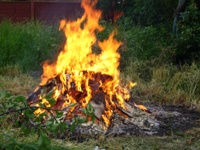Bonfires
No natural surplus material is removed from the plot or burned. There has not been a bonfire on this land since our arrival in 1995. All natural surplus is composted. We substituted a bonfire with a Wildlife Heap which takes up a relatively small part of the garden and provides shelter and food for a variety of wildlife. More about the Wildlife heap and composting...
What's wrong with bonfires?
Bonfires do cause a nuisance and discomfort to neighbours and the community, but above all are a waste of valuable natural nutrients that if left on their own for a year will decompose and become soil rather than particles floating around the deteriorating atmosphere. The enriched soil derived from the decomposition process is of great value to healthy wildlife food chains.

Leaves especially are an excellent soil supplement (created from sun, rain and soil nutrients during the warm months of the year). If left for a year they decompose into 'leaf mould' or 'gardener's gold'.
The toxic potential of the polluted air of a bonfire on the lungs of 'passive bystanders' seems to be under-rated. If a tobacco leaf is known to be carcinogenic, why wouldn't any other burned leaf or other vegetation be carcinogenic?
If a bonfire is absolutely necessary:
- Only burn natural dry material - usually that has been left to dry out for at least a month. It is essential that the material is not wet or damp as this will result in much greater smoke emission. The driest material generates an almost invisible 'plume'.
- Household materials must not be burned.
- The weekends when neighbours are more likely to be outdoors enjoying their gardens should be bonfire free.
- When the air is foggy, misty or damp is the worst time to have a bonfire going. The smoke pollution will combine with the water particles and air quality will deteriorate even more.
- The fire should not be smouldering through the night when the cooler air of the night will suppress the smoke dispersal and keep it lingering at ground level.
- Put the fire out with water before nightfall.
Legal responsibilities upon householders
Under the Waste Management (England & Wales) Regulations 2006 it is an offence to dispose of domestic waste in a way likely to cause pollution of the environment or harm to human health. Householders have a duty of care and must take all reasonable measures to make sure household waste produced on their property is disposed of without endangering health or harming the environment. This applies to any type of waste that is unsuitable for disposal in your dustbin and unable to be taken as part of the weekly household waste collections. The Waste (Household Waste Duty of Care) (England and Wales) Regulations 2005 make householders legally responsible for ensuring their household rubbish is only passed on to an authorised person for disposal. The legislation is designed to help reduce the amount of dumped rubbish or fly tipping. If illegally disposed of waste is traced to your household, you may be fined up to £5,000 in a Magistrates Court.
